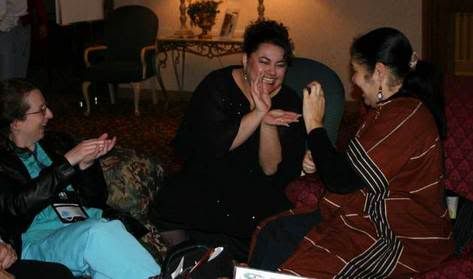Grimy, with eyes sunk deep into his face yet with an intensity showing through the unkempt hair, his hand outstretched. This was the face that greeted me upon leaving the theater, muttering yet making such direct eye contact. These are the faces that greet us as we move through the city, and we try not to notice them. These are the faces whose stories we'd rather not hear. These are the homeless.
I had flown west for a few days to visit friends in the Napa Valley. Knowing I'd want a fix of culture upon fleeing my provincial small midwestern town, they'd acquired another ticket for a play at the ACT in San Francisco's theater district, "The Voysey Inheritance." The play, David Mamet's adaptation of a 1905 play by Harley Granville-Barker, revolved around the dilemma of Edward Voysey. Inheriting the family business, he realized he'd also inherited the family thievery, as client accounts were pilfered over the years in failed investment schemes. As Edward tries to wrestle with time in his efforts to make things right for his clients, he comes to realize that no one else in the family seems bothered by this legacy. In other words, the play was in part a story of wealth and privilege, privilege extending to allow the rich to play by different rules. Well done, with, as playwright Mamet comments in his notes, new questions to ponder.
The question I'm left pondering does not arise directly from the play itself, but a juxtaposition of events. Leaving the theater and walking into the wonderful early spring day, we moved along in the happy jumble of theater-goers discussing where to get the after theater drink or mocha. Two doors down, those eyes lock sights with us. Just behind me, another theatergoer speaking loudly says to her companions, "Homeless guy on the right!" and continued in that same loud voice to make degrading remarks. My immediate reaction was two-fold; first, he's without a home but not necessarily without hearing, and second, what was one of the themes we just saw play out on stage?
I commented on the second reaction to my friends, who agreed that a point was missed or ignored. I don't think we talked much more about that incident during my visit, though we certainly covered other ground on related topics.
Returning home, those eyes and that face and the entire incident, while not quite haunting me, have wandered in and out of my thoughts. As I've played and replayed the incident and my thoughts, I've come to realize that what I find most degrading in the behavior of that theatergoer is her absolute lack of any obvious desire to consider that man's story. Dirty, homeless and marginal, he is still a fellow human. What is the story he would tell us about his journey to that street in San Francisco on a sunny spring day, asking for handouts? Can we assume that his situation is completely the result of poor life choices? I think we'd like to think so, as it makes it easier for us to ignore and avoid contact this way.
Is it possible, though, that maybe his situation could be not so far from that of some of us? Could it be a case of mental illness left without a safety net as the social service system becomes overburdened and underfunded? Perhaps he served in the Gulf War and returned with Gulf War Syndrome, turning to substances to dull the nightmares? We don't know, and we don't want to know.
The question becomes, why don't we want to know his story? Is it because by knowing, we have to acknowledge his humanity, placing him on equal footing with any of the rest of us?
This man appeared to be one of the extremes, but in my visits at Place of Grace, mentioned in another entry here, I've come to learn that appearances are sometimes deceiving when it comes to the poor or homeless. Mothers who were waitresses, former soldiers, young families, they all bring their faces and their stories to us. If we listen, maybe we'll start to understand their stories and how perhaps we might begin to change the stories to have happy endings. If we listen, maybe we'll start to understand there is no longer just "them." Perhaps we'll understand we're just "human beings all."
What is this man's story? I'll never know. I didn't ask him. I'm not sure he'd have been capable of telling me at that moment in time. What I know is this: instead of looking away and pretending he didn't exist, I returned his gaze. I'd like to know his story.
